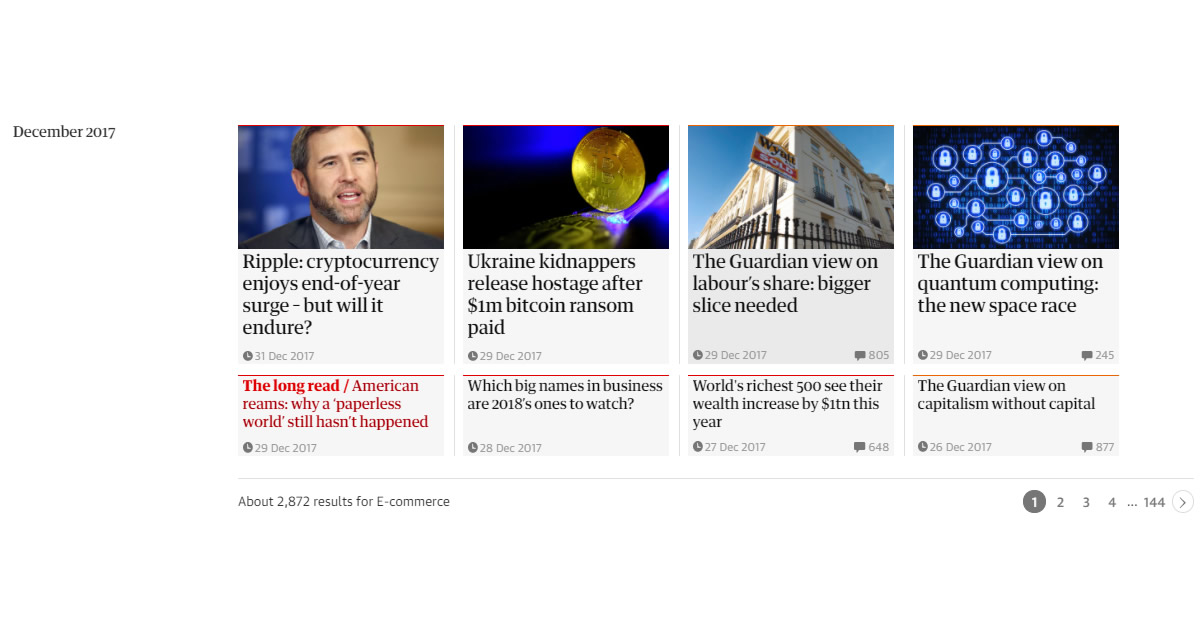Amazon Go: convenience and concern at new checkout-free corner shop
All around me in this Seattle corner shop, people are grabbing items off the shelves, shoving them into bags or pockets, and bolting for the door. It would feel like well-mannered looting if not for the hi-tech gates where shoppers have to swipe in with their smartphones.
This is the first day that Amazon’s new checkout-less convenience store, Amazon Go, is open to the public, and shopping is even easier than online. There is no tedious clicking or scrolling, no banner ads to negotiate nor passwords to remember. Simply present the Amazon Go app at the gates and start shopping.
Amazon's first checkout-free grocery store opens on Monday
Amazon will open its first checkout-free grocery store to the public on Monday, moving forward with an experiment that could dramatically alter bricks-and-mortar retail.
The Seattle shop, known as Amazon Go, relies on cameras and sensors to track what shoppers remove from the shelves, and what they put back. Cash registers and checkout lines become superfluous: customers are billed after leaving using a credit card on file.
To start shopping, customers must scan an Amazon Go smartphone app and pass through a gated turnstile.
The Amazon worker: paid £18,000 a year to shift 250 items an hour
If I’ve learned anything from doing this job, it’s that money can’t replace time. I work four nights a week in an Amazon warehouse near my home in Southend-on-Sea. It’s quite a cold place to work and, apart from two half-hour meal breaks, I’m on my feet for 10 and a half hours. I scan the items the trucks bring in from distributors and place them into the right cart for the robots to take to the correct place in the warehouse.
I have to put away each item in 15 seconds or less, and get through 250 in an hour, or I’ll be given a warning by a manager. Stepping away from my station to, say, get a drink of water can have a big impact on my performance.
During my half-hour breaks I rush downstairs to have something to eat. It’s stressful – and it definitely affects my health, standing up for hours on end. I worry I may pass out if I don’t rest during my meal breaks. I’ve lost a lot of weight since I started.
Amazon's labour-hire deal and the impact on collective bargaining
Amazon is recruiting in Australia. The job ads in Sydney and Melbourneshow it is looking for skills such as IT and engineering support, sales and account management and “solutions architects”.
But there aren’t any warehouse or distribution jobs listed in Amazon’s Dandenong South fulfilment centre, even though the global internet retail giant launched its Australian operations in December.
According to the National Union of Workers (NUW) national secretary, Tim Kennedy, the reason is simple: labour hire. Amazon has a global contract with Adecco to supply workers, and the union believes most, if not all, of the 200 workers at Dandenong South are hired through the labour-hire firm.
Amazon's next top headquarters: US cities strut their stuff as firm seeks second home
Two hundred and thirty-eight candidates have been whittled down to 20. Getting there was “very tough” and everyone showed “tremendous enthusiasm and creativity”, but there will be only one winner in the hunt for America’s Next Top Amazon Headquarters.
The bizarre beauty contest has seen mayors around the country attempt to woo the $600bn technology company to build its second headquarters, Amazon HQ2, in their city, with offers of generous tax breaks, subsidised construction costs, gifts (including a giant cactus from Tucson, Arizona) and even name changes.
What’s at stake? Jobs! 50,000 of them! Paying an average of more than $100,000 each. It’s the urban planning equivalent of an Oprah giveaway. “You get a job! You get a job! You get a job!” At a time when the job market is stagnant, it’s no wonder that cities have discarded their dignity in their bids.
Birmingham, Alabama, installed giant buttons in the city resembling Amazon’s one-click ordering Dash devices. Instead of automatically ordering replacement laundry detergent, the buttons would trigger one of 600 tweets attempting to sell the city to the technology company.
When it comes to estate agents, the future could be purple
Plot the share price of Purple Bricks against Countrywide over the past few years and it tells you all you need to know about where estate agency is heading.
Purple Bricks, the internet upstart offering fixed-price home selling for £849, has seen its share price more than quadruple from 95p at its start of trading on 18 December 2015 to 422p now. On that same day shares in traditional estate agency Countrywide were changing hands at 400p. Today they are 113p after yet another warning about disappointing profits.
Countrywide could, just about, cope if its problems were purely cyclical. Transaction activity, more important to estate agents than rising house prices, has fallen significantly in the crucial London market. The volume of sales is down, and the time it takes to close a sale is rising.
How Oxfam became the rising star of UK's online fashion industry
It’s one of fashion’s best kept secrets, a website where you can buy luxury brands such as Burberry, Prada and Miu Miu as well as the best of the high street for a steal.
Sales were up 33% at Christmas as shoppers bagged vintage and designer clothes for the party season but the company is not listed on the stock exchange like the web giant Asos and there is no chance of it ever being taken over. And if you look closely some of the clothes might seem familiar.
In fact they might actually be your clothes – because Oxfam has emerged as an unlikely rising star of the UK’s fast-growing online fashion scene as it casts an increasingly canny eye over the branded cast-offs and vintage styles dumped in bin bags on its shops’ doorsteps every day.
“It is a big secret but when people hear about our website they are really intrigued,” says Oxfam trading director Andrew Horton who wants to double the size of the web operation to reach 10% of retail sales over the next three years.
Online fashion retailer Boohoo doubles sales over festive period
Sales at the online fashion retailer Boohoo doubled at Christmas as young women flocked to the website for party outfits and gifts.
The Manchester-based company, which also owns the PrettyLittleThing [PLT] and Nasty Gal online brands, is winning sales from traditional high street retailers as it cashes in on a generation that shops via their mobile phones and takes style cues from social media.
Boohoo said group sales surged 100% year-on-year to £228.2m in the four months to 31 December, thanks to stellar sales during the Black Friday promotional bonanza in November.
Jeff Bezos: where the $106bn man belongs on the all-time rich list
ust 10 days into 2018 and Jeff Bezos, the founder of Amazon and a thorn in the side of Donald Trump, has seen his personal wealth soar by $6bn (£4.4bn).
The man at the helm of the sprawling online empire – which accounted for an extraordinary 89% of online Christmas trading at big US retailers – Bezos is now worth $106bn, enough to cover Britain’s budget deficit twice over and still have change.
Officially, he is the richest man on the planet – the latest in a list of plutocrats stretching all the way back to Croesus, the king of Lydia in the 6th century BC who was so rich he had an expression name after him. Only once before has one man been worth twelve figures, when Bill Gates’s fortune hit its peak of $100bn at the height of the dotcom bubble in 1999. Bezos overtook Gates last year and the gap has widened almost daily.
The strong case for a citizens’ wealth fund
Professor Steve Schifferes says a citizens’ wealth fund in the UK could be the key to boosting productivity, tackling inequality, and giving citizens a new sense of control over their lives. Plus Michael Gold says that if the tech giants paid tax properly there would be no $1tn company on the horizon.
I strongly endorse your editorial (30 December) suggesting that a UK citizens’ wealth fund could make a major contribution to reversing the worrying growth in inequality, particularly wealth inequality, in the last few decades. The estimates by my project team suggest that it would be feasible to create a £1tn citizens’ wealth fund within a generation, partly based on making better use of our estimate of £3tn in publicly owned assets. In our view, such a “Next Generation Fund” could make an important contribution to reducing intergenerational inequality as well, and ensure that an increased level of public spending and public investment can be afforded in the future when the revenue that can be raised from taxation will be constrained by the increase in the number of older people relative to those in work.
Shares in spread betting firm Plus500 soar thanks to bitcoin boom
The growth in gambling on the yo-yoing value of cryptocurrencies using risky derivatives products has helped boost the profits of the financial spread betting firm Plus500.
The London-listed company’s shares rose 130% in value last year and gained nearly another 25% on Wednesday after it said there had been increased interest throughout 2017 in cryptocurrencies such as bitcoin.
Plus500 said annual profits would be ahead of market expectations after record revenues in the final three months of the year, when bitcoin’s value surged from about $4,000 (£2,960) to more than $19,000 before falling back below $14,000 in late December. The company added about 246,000 customers last year, more than double the number in 2016.
Plus500 and other financial spread betting firms offer derivatives products known as contracts for difference (CFDs), which allow investors to gamble on the price of an asset without ever owning it.
The Financial Conduct Authority has found 82% of customers lose money on CFDs, with average losses of £2,200 per person. Experts warned bitcoin CFDs could result in steeper losses than owning the actual cryptocurrency, should the market crash in the coming months – as forecast by some economists.









